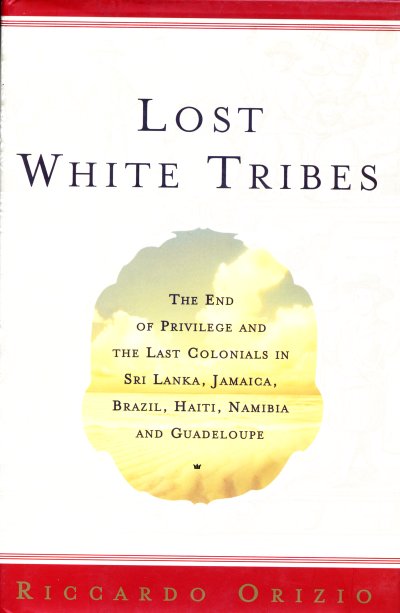

Reviewed by Paul M. Clayton
The last of the European colonies faded away after the end of World War II, but descendents of the settlers and administrators remain in ghostly communities all over the third world. In Namibia, Dutchmen driven out of their South African homes intermarried with African women and started a sturdy and long-lasting farming society that is struggling to hold onto its land in the face of post-colonial political upheaval. In Sri Lanka, the children of wealthy planters live in crumbling mansions and try to keep up old social customs that matter not a whit to anyone outside the few surviving families. And in the Caribbean, Haitian descendents of Napoleon's Polish mercenaries living in destitution deep in the jungle. One thing is the same everywhere - the men all deny any misogenistic tendencies in themselves, but are certain all the other men are sleeping with the natives.
"In the evening, he told me, after working in the sun all day, he likes to watch television, 'As you do in Europe, right?' The other day he was watching the Olympics from Atlanta when the TV broke down.
"As we were leaving, Cleve smiled one of his rare smiles. 'Television? I'll tell you where he goes in the evening: to his girlfriends. He's got at least five.' Then he made an obscene gesture and added: 'All black.'"
This from the descendents of German indentured servants in the mountains of Jamaica. Far removed from the cosmopolitanism of "Mo Bay", a few hundred half-castes of German descent eke out an agricultural living in remote Seaford Town. The memories of the hellish voyage from Europe in 1834 and the years of virtual slavery in the wilds of Jamaica linger on in the folklore. These are people cut off and abandoned by their culture, who have not yet completely assimilated into their host culture. Yet they live on good enough terms with their neighbors to have a decent life on their subsistence small-holdings.
The last Confederates maintain a cult of Robert E. Lee in Brazil. Their forebears knew nothing of servitude, and brought enough wealth and know-how to duplicate the lifestyle they had known in the South to their new country. The horror of misogyny that they brought with them was honored more in the breach, just as it had been at home. They have prospered, and are an integrated part of the cosmopolitan Brazilian culture. While the girls may wear crinolines and the boys rebel soldier suits, their features are no longer Scotch-Irish, German or English. They are the lucky ones.
The Blancs of Guadeloupe are ostracised for their incestuous practices which are the only way the small colony can keep it's blood caucasian. Unfortunately, the nearby Saintes who suffer similar genetic decay refuse to have anything to do with the Blancs. The Saintes are managing to get by with a fishing based economy, while the sugar cane plantations of the Blancs have fallen into ruin.
Riccardo Orizio traveled around to all these places with his girlfriend in tow. His native Italy provided many of the colonists, but since Italy is not associated with the imperial powers of Western Europe, he is much better able to travel around the post-colonial world without triggering resentment and distrust. It also doesn't hurt that he is a first-class journalist. Avril Bardoni's translation is fluid and literate. All told, this is a wonderful book for people like me who are intrigued by the strangeness of human culture and existence. As homogenous as life is for the vast majority, there are people in the lost places living almost unimaginably strange lives.
Home->Reviews->Lost White Tribes